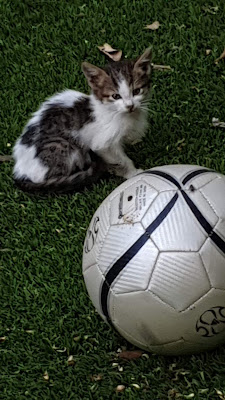So, a day in Jerusalem is always special for me. As I rode from the Central Bus Station to the YMCA, there was a petite blonde girl in an army uniform with a big musical instrument case on her back. She got off at the same stop I did, but she walked much faster than I did to wherever she was going. To my surprise (and delight), she was the cello player in the string quartet that introduced the evening. Just another example of what a small world it is and how I feel so connected to my fellow citizens.
On to the opening ceremony. After a lot of thanks and recognition of dignitaries, which took even longer because there were in Hebrew and in English, the chair of the selection committee explained the criteria for the award and why Joyce Carol Oates is such a worthy recipient. The Jerusalem Prize is awarded every two years to international writers "whose body of work assert 'The Freedom of the Individual in Society'," and in her acceptance speech, Oates proclaimed that "without freedom, there is no art."
She also spoke of her paternal grandmother, who bought her books, paid for piano lessons, bought her a typewriter, and took her to get a library card. After her grandmother died, Oates learned that she was Jewish and basically erased that part of her life. Oates' 2007 novel, The Gravediggers' Daughter, is based on her grandmother's life and "her family history that was filled with pockets of silence."
The evening included a tribute to Amoz Oz, the noted Israeli author who died in December of 2018. Oates is also a fan of his, and quoted from Oz's 2002 memoir A Tale of Love and Darkness:
"When I was little, my ambition was to grow up to be a book. Not a writer. People can be killed like ants. Writers are not hard to kill either. But not books: however systematically you try to destroy them, there is always a chance that a copy will survive and continue to enjoy a shelf-life in some corner on an out-of-the-way library somehwere in Reykjavik, Valladolid or Vancouver."
And here is one of my favorites:
"While it was true that books could change with the years just as much as people could, the difference was that whereas people would always drop you when they could no longer get any advantage or pleasure or interest or at least a good feeling from you, a book would never abandon you. Naturally you sometimes dropped them, maybe for several years, or even forever. But they, even if you betrayed them, would never turn their backs on you: they would go on waiting for you silently and humbly on their shelf. They would wait for ten years. They wouldn't complain. One night, when you suddenly needed a book, even at three in the morning, even if it was a book you had abandoned and erased from your heart for years and years, it would never disappoint you, it would come down from its shelf and keep you company in your moment of need. It would not try to get its own back or make excuses or ask itself if it was worth its while or if you deserved it or if you still suited each other, it would come at once as soon as you asked. A book would never let you down."
In Search of Another Prize
I've been having a lot of fun with ScaVentures Jerusalem: The Experiential Guidebook by Tali Kaplinski Tarlow. Whether hanging out by the windmill (May 2018), or giving myself a mini-mission as I pass through the Machane Yehuda Market (December 2018), I've seen things I don't normally look for, and by doing so, learn more about Jerusalem and Israel.
But my best and most exciting experience was at the beginning of the month when I joined a group of "influencers" to test the "app" of the ScaVentures Guide to Machane Yehuda, better known as "the Shuk Dash." Tali split us into teams and gave us a brief history of the area. In the early 20th century, it was an open field where Arab merchants sold their produce out of crates. The field was owned by the wealthy Valero family, of Spanish descent, and it was originally called the Valero Market.
 |
| Chaim Aharon Valero (1845-1923) |
The beauty of "touring" the shuk this way is that it is experiential. Whether you are holding a raw fish or searching to find the green wall, you are interacting with all kinds of people, really looking around the area, and using the strengths of your team to complete the missions. At first I thought, "How can I spend two hours in the market?" But as the clock ticked down, and we had to return to base, I reflected that I could probably use another hour, and I would still not see all there was to see.
So here's a shameless plug (on my part, no Tali's) for Israel ScaVentures:
Israel ScaVentures
Shuk Dash
And of course, as Spring has sprung, the Real Cats of Israel are also out and about. This feisty little kitten is trying her paws at soccer:
Happy Reading!






No comments:
Post a Comment
Note: Only a member of this blog may post a comment.